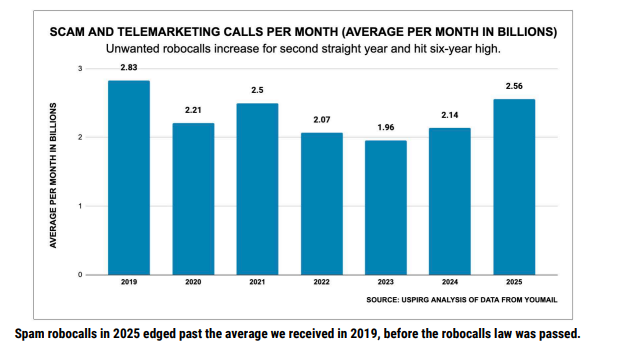Americans are being bombarded by billions of scam calls each month, and a new report warns that AI is supercharging schemes to make them more convincing.
In its Ringing in Our Fears 2025 report, the U.S. PIRG Education Fund says Americans are receiving an estimated 2.56 billion scam and telemarketing calls every month through September, up from 2.14 billion a year ago.
“Billions of calls are a lot. When you drill down to individual people, 31% of American adults say they get at least one scam phone call a day, according to Pew Research Center. For an unlucky 21%, they get several scam calls a day.”

The consumer watchdog says victims are losing an average of $3,690 to phone scams and $1,452 to scam texts just in the first half of the year.
The U.S. PIRG also says that the rise of generative AI is making matters worse for scam targets.
“The same AI programs that can write essays and advise on business decisions can also create fraudulent but convincing security emails and automate nearly every step of a scammer’s workflow.”
While fraudsters use AI in a number of ways to steal people’s money, the watchdog says they all tend to fall in one of the three categories, including deepfake scams, text-based scams and hacking.
“While no one can paint a clear picture of where all this is going, AI will likely drive a massive increase in the number of very convincing scams. Anyone with a phone or email address is vulnerable. It’s important to understand how AI is changing the playing field, and what we can do to keep each other safe.”
To protect Americans from scammers, the U.S. PIRG recommends that people be aware of publicly posting their videos and images, agree on a safe word with their loved ones, independently verify the identity of the caller and don’t use voice authentication, among others.
Disclaimer: Opinions expressed at CapitalAI Daily are not investment advice. Investors should do their own due diligence before making any decisions involving securities, cryptocurrencies, or digital assets. Your transfers and trades are at your own risk, and any losses you may incur are your responsibility. CapitalAI Daily does not recommend the buying or selling of any assets, nor is CapitalAI Daily an investment advisor. See our Editorial Standards and Terms of Use.


